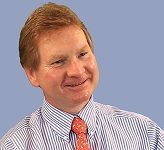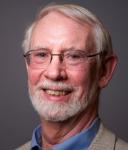-
Quantum Middleware:
The Key to Quantum Computing in the CloudColin P. Williams - D-Wave Systems Inc, Burnaby, BC, Canada
Colin P. Williams
D-Wave Systems Inc, Burnaby, BC, CanadaWednesday, December 14
Faculty of Law - Aula 1Quantum computing is emerging quickly as a new computational paradigm that has the potential to revolutionize many fields. However, the extreme and exotic conditions needed to achieve quantum computation force us to consider deploying quantum computers in the cloud. This necessitates the development of "quantum middleware" to convert computational problems posed in familiar languages to a form amenable to solution by quantum computer, and to orchestrate the running of those quantum computations remotely in the cloud. In this talk I will describe D-Wave's approach to quantum computing, including the system architecture of our 1000-qubit D-Wave 2X, its programming model, and performance benchmarks as well as the quantum middleware we have built to support the remote operation of quantum computers in the cloud. I will then describe how such quantum middleware enables cloud-based quantum processors to tackle problems in a variety of fields including medicine, machine learning, and computational finance.
Speaker Bio
 Colin Williams is Director of Strategy & Business Development at D-Wave Systems Inc. Prior to joining D-Wave, Colin was a Senior Research Scientist (SRS) and Program Manager for Advanced Computing Paradigms at the NASA Jet Propulsion Laboratory, California Institute of Technology. Earlier, as an acting Associate Professor of Computer Science at Stanford University, he taught courses on quantum computing and quantum communications, and computer-based mathematics. Colin earned his Ph.D. in artificial intelligence from the University of Edinburgh in 1989 and wrote “Explorations in Quantum Computing,” one of the first textbooks in the field.
Colin Williams is Director of Strategy & Business Development at D-Wave Systems Inc. Prior to joining D-Wave, Colin was a Senior Research Scientist (SRS) and Program Manager for Advanced Computing Paradigms at the NASA Jet Propulsion Laboratory, California Institute of Technology. Earlier, as an acting Associate Professor of Computer Science at Stanford University, he taught courses on quantum computing and quantum communications, and computer-based mathematics. Colin earned his Ph.D. in artificial intelligence from the University of Edinburgh in 1989 and wrote “Explorations in Quantum Computing,” one of the first textbooks in the field.
-
Record Management in the Cloud:
“Keep it Cheap Stupid”David Lomet - Principal Researcher, Microsoft Research, USA
David Lomet
Principal Researcher, Microsoft Research, USAThursday, December 15
Faculty of Law - Aula 1A cloud service provider with the lowest cost of service can either charge less or make a higher profit margin. To keep costs low requires exploiting commodity hardware. So the software task is not necessarily to provide the highest performance but rather to provide the best performance per dollar on this “cheap” hardware. This requires efficient systems that are flexibly architected to run well on current commodity hardware and to be adapted easily to new commodity hardware as it evolves. This talk will sketch the lessons we learned in the Deuteronomy record management project, with its successful use in Microsoft’s Hekaton main memory database system, Azure DocumentDB, and Bing Object Store. We describe the Deuteronomy techniques that led to high efficiency and explain why they succeeded.
Speaker Bio
 David Lomet is a principal researcher in and founder of the Database Group at Microsoft Research, Redmond. Earlier, he worked at DEC’s Cambridge Research Lab, at IBM Research Yorktown, and was a professor at Wang Institute. He has a Ph.D. from the University of Pennsylvania. David has worked in machine architecture, programming languages, and distributed systems. His primary work is in database systems and he is one of the inventors of transactions. His most recent work is on the Deuteronomy project, whose transactional key-value store exploits clean architecture and provides high performance. He has authored over 100 papers, including two SIGMOD "best papers", and holds over 50 patents.
David Lomet is a principal researcher in and founder of the Database Group at Microsoft Research, Redmond. Earlier, he worked at DEC’s Cambridge Research Lab, at IBM Research Yorktown, and was a professor at Wang Institute. He has a Ph.D. from the University of Pennsylvania. David has worked in machine architecture, programming languages, and distributed systems. His primary work is in database systems and he is one of the inventors of transactions. His most recent work is on the Deuteronomy project, whose transactional key-value store exploits clean architecture and provides high performance. He has authored over 100 papers, including two SIGMOD "best papers", and holds over 50 patents.David is a Fellow of IEEE (and Golden Core Member), ACM, and AAAS. He was awarded the IEEE Meritorious Service Award and SIGMOD Contributions Award for serving as Editor-in-Chief of the IEEE Data Engineering Bulletin since 1992. He currently is on the IEEE Computer Society Board of Governors and will serve as 1st Vice President next year. He has been ICDE PC co-chair and conference co-chair, VLDB PC co-chair, and editor of ACM TODS and VLDB Journal. He has served on the VLDB Board and the ICDE Steering Committee, and has been IEEE TCDE Chair.








